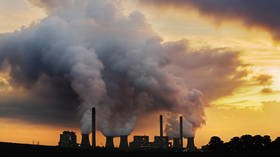IEA gives world reality check on ‘dirty’ coal use

The International Energy Agency (IEA) said on Friday that rising consumption in China, India and the US could bring the demand for global coal-fired power to a new high this year, despite efforts to cut greenhouse gas emissions.
According to the report, global power generation from coal is expected to grow by 9%, reaching 10,350 terawatt-hours. The growth will be driven by a rapid economic recovery that has “pushed up electricity demand much faster than low-carbon supplies can keep up.”
The IEA highlighted that overall coal demand, including for industries such as cement and steel, could rise by 6% this year. It will not exceed the record consumption levels of 2013 and 2014, but could hit a new all-time high next year, the IEA warned.
The increase is “a worrying sign of how far off track the world is in its efforts to put emissions into decline towards net zero,” said IEA Executive Director Fatih Birol.
China, which consumes more than half of the world’s coal, is expected to see a 9% year-on-year increase in global coal-fired power generation in 2021. India’s generation is forecast to rise by 12% this year.
As part of the climate talks in Glasgow last month, countries finally agreed to “phase down” coal consumption to keep global temperature rises as close to 1.5 degrees Celsius as possible. China has also pledged to start reducing coal consumption, but will do so only after 2025.
For more stories on economy & finance visit RT's business section















